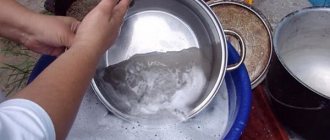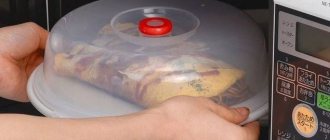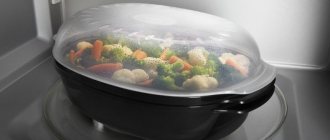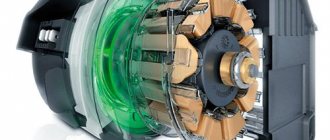When a dishwasher first appeared in my apartment, I thought - here it is, a lifesaver that will now clean the kitchen for me!
I think your first impression was about the same. And, like me, it was most likely followed by slight disappointment: a dishwasher is not a magical solution to all problems, it is just a tool. Which, like any other tool, has its limits and limitations. [/td]
| Would you like a GIFT from me personally? Enter your email and I'll send you a free recipe book! |
Washing dishes has become faster, but loading and unloading the dishwasher still takes a lot of time. It is demanding on water quality. If it breaks, it is usually at the most inopportune moment. And the worst thing is that not all dishes can be washed in it!
You probably read in the instructions before using it for the first time about what types of dishes should never be put in the dishwasher, and you’ve probably already forgotten half of them. For this reason, I decided to translate an article I discovered on my favorite English-language website about what types of dishes should not be washed in the dishwasher. This article was written by Daniel Gritzer, a man with a thorough approach and good theoretical background, so you can rely on him. And don't be alarmed by how long this list is. After studying it, you can rest assured: all other dishes can be washed in the dishwasher!
So, here's what you can't put in the dishwasher:
Knives and all cutting devices
Examples:
- any kitchen knives;
- graters;
- food processor knives;
- mixer knives;
- mandolins and hand slicers.
Causes:
There are several reasons why cutting devices should not be washed in the dishwasher. The first of them is safety. If you or someone else carelessly disassembles the dishwasher, you risk cutting yourself by tripping on the knife or picking it up at the wrong end. In addition, detergents have a bad effect on the knives themselves, dulling them even faster, which is especially important for amateur cooks who neglect the good habit of regularly sharpening their knives.
Similarly, the handles of knives may suffer, and the metal from which they are made may become rusty. Finally, knives can also damage your dishwasher - for example, cutting the rubberized inserts, which will lead to rust.
Utensils made of any metal (except stainless steel)
Examples:
- cast iron cookware;
- carbon steel frying pans;
- non-stick frying pans;
- utensils made of enameled cast iron;
- copper frying pans, pots and other utensils;
- aluminum cookware, baking trays and other utensils.
Causes:
By and large, you should keep any metal other than stainless steel away from your dishwasher (and even that is susceptible to corrosion in certain cases). A cast iron or carbon steel pan will instantly lose the protective film of oil you've spent so much time creating and will begin to rust or at least lose its non-stick properties. Cookware made of enameled cast iron seems to be protected, but it may chip and its edges may also be damaged.
Aluminum will not rust, but will most likely lose its cheerful shine - since this metal enters into chemical reactions very readily, it is covered with an oxide film, which will quickly disappear under the influence of detergents. Utensils made of copper or brass will also lose their presentation. As for non-stick frying pans, they basically don’t require much cleaning, you just need to wipe them down (and if that’s not the case, then it’s time to replace your frying pan).
Metal objects
Not every metal product likes to take a bath in the dishwasher. This is what we should wash exclusively with our hands, because the machine version of these products is prohibited:
- Cast iron frying pans and pots. Over time, they will become covered with rust from constant excess water. And the high temperature will wash away the thin protective fat layer that forms after the first use of the frying pan.
- Aluminum cookware. Under the influence of detergents, it oxidizes and deteriorates.
- Silver products. When cleaned in the machine, they become dark and stained. This significantly spoils the appearance.
- Products made of tin, copper. They also become covered with dark spots when exposed to high temperatures.
- Teflon coated frying pans. It does not like temperature changes and the aggressive effects of detergents. We ourselves can easily and delicately remove dirt. And this will increase the service life of such dishes.
ATTENTION! Any metal products with wooden handles should also be washed exclusively by hand.
Fragile glass and thin porcelain
Examples:
- fine porcelain;
- plates with gilding or hand painting;
- measuring cups with marked marks;
- plates with gilding or hand painting;
- milk or uranium glass;
- fragile crystal and glasses with thin stems.
Causes:
Any glass, crystal, porcelain or ceramic dishes that are dear to you should be kept out of the dishwasher. Otherwise, you risk breaking it, which could damage your dishwasher. Painting and gilding may fade if regularly washed in the dishwasher, and glass or crystal may become cloudy and discolored. Of course, this does not mean that washing such dishes in the dishwasher is completely contraindicated, just make sure that you carefully evaluate the pros and cons.
For which dishes is this cleaning method not suitable?
Next, it is advisable to find out which dishes cannot be washed in the dishwasher:
- Wooden kitchen utensils should only be cleaned by hand. Household appliances can wash out natural oils from them, the products will dry out and gradually begin to crack.
- It is also strictly forbidden to place the electric kettle in the dishwasher: the wires, LED, switch placed inside the product will immediately become unusable, and the metal contacts will become covered with oxides. It is better to carefully rinse the electric kettle under the tap, avoiding moisture getting inside the body.
- Acrylic or melamine dishes cannot withstand high temperatures, steam drying, or the influence of any detergents. After such washing, the products do not look very aesthetically pleasing; cracks form on them.
- The cast iron frying pan is washable only by hand. This cookware quickly rusts when exposed to water for a long time, and when exposed to chemicals, the non-stick layer can completely peel off. Temperature changes also negatively affect this material.
- Teflon-coated pans should not be placed in the dishwasher. Visually, you may not notice any damage, but the kitchen utensils will lose their factory characteristics.
- If the label does not indicate that plastic utensils can be washed in the dishwasher, it is better not to do so.
- Milk glass may turn yellow after just two loads under the influence of high temperatures and aggressive detergents.
- Products with a vacuum lid cannot be cleaned using a dishwasher: the utensil will be deformed and lose its seal.
- If you wash aluminum cookware in the dishwasher, a white coating will form on it, which can only be removed with abrasive substances. Due to oxidative processes, the material can also become irreversibly blackened, which is why aluminum cookware should not be washed in a machine.
- It is not recommended to place the pressure cooker lid into household appliances: small particles of dirt can clog the valves, and harsh detergents can damage silicone or rubber seals. The multicooker bowl will also not withstand the washing process; its inner coating will be damaged.
- Loading metal graters, strainers, and garlic presses is contraindicated. The machine cannot cope with washing out small stuck pieces of food, and the food itself runs the risk of becoming rusty. Aluminum utensils (for example, colanders) should also not be washed in the dishwasher.
- It is strictly forbidden to place exclusive hand-painted items in an automatic wash, otherwise the entire decor will be washed off or damaged.
- Cast iron cookware, grates and other utensils made of this material will soon become covered with rust after mechanical washing. You should not wash cast iron cookware in the dishwasher because it forms a protective barrier (a thin layer of fat that appears after the first cooking of the dish). This layer is destroyed in the machine, so you cannot wash a cast iron frying pan in the dishwasher.
- Silverware is also prohibited, since the chemical composition of dishwasher tablets causes dark stains on cutlery.
- Copper utensils will begin to oxidize and become covered with plaque, which can only be removed by polishing. Therefore, pans made of this alloy and pots cannot be washed in the dishwasher.
- Washing damaged glasses and plates is contraindicated, as there is a risk of damaging the equipment due to pieces of dishes breaking off during the cleaning process.
- By placing jars and containers with stickers into the device, the user risks clogging the drain hole with particles of paper and glue.
- Washing thermoses and thermal mugs in the dishwasher is prohibited. The inner part of the vessel under the influence of vibrations is easily damaged and loses its properties. Bacteria and food particles penetrate into the space between the body and the flask, and the material begins to rot, which is accompanied by an unpleasant odor.
- Decorative items - figurines, vases, etc. are also prohibited from being cleaned in this way, since there is no guarantee that they will be durable and will not break.
- It is not advisable to wash knives in the dishwasher. There is a risk of scratching internal parts and plastic mechanisms of the equipment. In addition, due to exposure to hot water and steam, the blades will become less durable.
Housewives often do not know whether baking sheets can be washed in the dishwasher. Meanwhile, many manufacturers include special attachments that allow you to conveniently place these bulky kitchen utensils inside the device (sometimes this will require removing the top tray intended for cutlery).
All mechanisms
Examples:
- pasta machines;
- meat grinders;
- hand chalks;
- pepper and spice mills;
- pressure cooker lids.
Causes:
One day, the Tin Woodman was caught in the rain and froze in place as his limbs instantly became covered with rust. It's a long story and it has many morals: we only have heart, brains and courage if we believe in ourselves; never lie; There's no place like home—but all of that is pretty trivial compared to the big lesson in this story: If you want your mechanical gizmos to keep working, don't put them in the dishwasher.
If it has gears, moving parts, handles or valves, wash it by hand according to the manufacturer's instructions.
Is it dangerous to clean cauldrons and pots in the dishwasher?
A cauldron and saucepan will not cause damage to the dishwasher if they are placed in it correctly. The main condition is to use the bottom tray to clean bulky dishes.
You cannot stack cauldrons and pots. As a result, they will not be washed, and the likelihood of damage to household appliances will increase.
What dangers does washing pans and pots pose to household appliances?
If you use your dishwasher correctly, there is little risk of it breaking. Pots and pans with wooden or plastic handles should not be placed in it. The fasteners may also not be able to withstand the significant weight of the cast iron product.
Light stainless steel will not harm your household appliance.
Why can’t you wash pans in the dishwasher without following the advice given? An impractical person pays twice. It is better to wash the frying pan by hand than to buy a new product in the future.
Some plastic devices
Examples:
- plastic cutting boards;
- plastic containers for storing food.
Causes:
Lately, we are increasingly hearing that plastic is more dangerous than is commonly thought, especially when it comes to children’s health. In particular, they say that constant washing in the dishwasher or heating in the microwave leads to its gradual destruction.
This has not yet been fully proven, and many believe that these are unsubstantiated claims of paranoids. But in the absence of clear evidence, it might be worth considering whether you should reduce the amount of plastic in your dishwasher. After all, there are many other materials that storage containers are made from - glass, metal, and so on. On a more practical level, some plastic items can be damaged by hot water in the dishwasher.
Cookware with a hollow handle or thermal insulation
Examples:
- corollas;
- silver plate;
- some pots;
- old-fashioned ice cream scoops;
- thermoses, travel mugs and other thermally insulated utensils.
Causes:
The author claims that he was once almost killed by a stainless steel frying pan, which had a hollow metal handle inside. He regularly washed it in the dishwasher, after which one day it literally flew into the air while heating it on the stove. It turned out that during regular washing, water seeped inside the handle, and when too much of it accumulated there, it was torn from the inside.
This is, of course, a rare case, but it serves as a reminder: water can get into cavities that are not intended for it, and this is most likely to happen in a dishwasher. A whisk or thermos may not explode like a frying pan, but the water will still take its toll - kitchen utensils may rust, mold, or lose their insulating properties.
What dishes are exposed to in the dishwasher
Why can one dish be put in the car without any problems, but another, on the contrary, is not even worth trying to wash in the dishwasher? The fact is that certain conditions are created inside the washing chamber that affect the material used to make the dishes. These conditions include:
- high temperature;
- strong chemicals;
- long stay in contact with water;
- forced drying with hot air.
Today, dishes are made from a variety of materials, including: glass, porcelain, iron, silver, aluminum, cupronickel, plastic, cast iron, crystal, earthenware, ceramics, Teflon and others. But even porcelain dishes are different and react differently to hot water and detergents. Let's figure out what you shouldn't put in the dishwasher.
Aluminum products have no place in the dishwasher
Aluminum cookware is number 1 cookware that should absolutely not be put in the dishwasher. Aluminum is a metal that reacts with many substances, including water, if certain conditions are created. Under the influence of detergent and high temperature, aluminum products acquire a dark gray coating, and this coating smears, leaving marks on the hands.
Out of ignorance, more than a dozen people have already had their food spoiled in the dishwasher:
- aluminum parts from a meat grinder;
- garlic press;
- spoons;
- bowls;
- ladles;
- baking sheets;
- frying pans;
- pots.
Some aluminum cookware becomes darker after just one wash, some only after a few washes. Therefore, there are those who wash everything and claim that nothing will happen. If you have damaged aluminum cookware, then in the article Why you should not wash aluminum cookware, you will find tips on how to clean it.
Wild things
Examples:
- bras;
- salmon;
- engine spare parts;
- computer keyboards.
Causes:
There are people who quite seriously believe that these things belong in the dishwasher. And this is true, I myself have read about recipes for cooking salmon in sous vide using a dishwasher. There’s probably no need to explain why you shouldn’t do this.
I bet that many, after reading this list, were depressed: it turns out that most dishes cannot be washed in the dishwasher. However, after carefully studying this text, you will understand that some of the items listed in it, once in the dishwasher, will not harm either it or your health, and it is quite possible that the risk in this case is justified. And, of course, there is good, simply great news in all this: the vast majority of ordinary dishes and cutlery can be washed in the dishwasher! After all, that's what it was invented for. Thanks to the Serious Eats website, based on materials from which I wrote this article.
| 10 simple recipes for dinners in 15 minutes Enter your email and receive a recipe book - instantly and for free! |
Author: Alexey Onegin
Who is this?..











